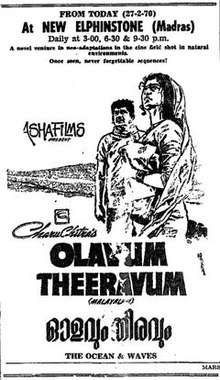Olavum Theeravum
Olavum Theeravum (Waves and the Shore) is a 1970 Malayalam-language film directed by P. N. Menon and written by M. T. Vasudevan Nair based on his own short story of the same title, published in an anthology of short stories in 1957. The story is about a Muslim trader who falls in love with his dead friend's sister who is the daughter of a prostitute.[1] But the girl's mother forces her to marry a wealthy man who has an eye on her. She rejects him but is raped by him and commits suicide. The film was produced by P. A. Backer, who later turned director, under the banner of Charuchithra.
| Olavum Theeravum | |
|---|---|
 Poster | |
| Directed by | P. N. Menon |
| Produced by | P. A. Backer |
| Written by | M. T. Vasudevan Nair |
| Based on | Olavum Theeravum by M. T. Vasudevan Nair |
| Starring | Madhu Usha Nandini |
| Music by | M. S. Baburaj |
| Cinematography | Mankada Ravi Varma |
| Edited by | Ravi |
Production company | Charuchithra |
Release date |
|
| Country | India |
| Language | Malayalam |
Olavum Theeravum has been credited with helping to bring about a "flowering of art-house films that have today become the defining quality of Malayalam cinema",[2] with being Malayalam cinema's "breakthrough into realism",[3] and as "a watershed in the history of Malayalam cinema".[4] The tragic realism in this art-house movie, which was also a commercial hit, later became a definitive formula for a whole generation of Malayalam directors, including P. A. Backer. MT's flawless script centering on the love affair of a trader with the daughter of a sex worker was the base on which P.N. Menon made this classic, which became a trendsetter for the realistic way of making movies in Malayalam. It is rightly regarded as one of the milestones in Malayalam cinema.[5]
Plot
Timber traders Bapputty (Madhu) and Abdu (Nellikkodu Bhaskaran) are friends. Ashamed of his mother Beevathu's (Philomina) immoral life after his father's death, Abdu runs away from his native village Vazhakkadavu and is engaged in timber trading. Abdu never returns to his home after that. On the way to the trading centre after loading timber from the forest Abdu falls ill and dies on the way. Bapputty reaches Beevathu's hut with Abdu's dead body. Bapputty takes pity on the family and decides to support them.
Here, Bapputty falls in love with Abdu's only sister Nabeesa (Usha Nandini) who also hates her mother's way of life but is helpless. Bapputty takes a decision to make enough money, marry Nabeesa and live happily. He leaves the village to distant timber depots to realise this dream.
Meanwhile, a rich trader Kunjali (Jose Prakash) who was away from his native village for a long time now returns. His sees Nabeesa and makes advances. Beevathu, who only thinks of making money, encourages Nabeesa to befriend Kunjali, but she avoids going anywhere near him. She keeps waiting for Bapputty to return and take her away. One day, with Beevathu's support Kunjali molests Nabeesa. On that fateful day Bapputty reaches the village and is heartbroken at the happenings. But the kind-hearted Bapputty who loved Nabeesa sincerely, affirms his decision to marry her. Nabeesa refuses and pleads with him to leave her. The film ends with Nabeesa's suicide and Bapputty staring at her swollen corpse washed ashore as he leaves the village.
Cast
- Madhu as Baputty
- Ushanandini as Nabeesa
- Jose Prakash as Kunjali
- Nilambur Balan as Mooppan
- Abbas as Butcher Moosa
- Ali
- Alummoodan as Narayanan
- Kunjava
- Mala Aravindan
- Nellikode Bhaskaran as Abdukka
- Nilambur Ayisha as Ayisha
- Paravoor Bharathan as Suleiman
- Pariyanampatta as Kadathukaaran Mammathu
- Philomina as Beevaathu
- Sujatha
- T. Damodaran
Soundtrack
The music was composed by M. S. Baburaj with lyrics by P. Bhaskaran and Moinkutty Vaidyar.
| No. | Song | Singers | Lyrics | Length (m:ss) |
|---|---|---|---|---|
| 1 | "Chaampakkam Cholayil" | S. Janaki | P. Bhaskaran | |
| 2 | "Idakkonnu Chirichu" | S. Janaki | P. Bhaskaran | |
| 3 | "Kandaarakkattummel" | M. S. Baburaj | Moinkutty Vaidyar | |
| 4 | "Kavililulla Maarivillinu" | P. Leela, Chorus | P. Bhaskaran | |
| 5 | "Manimaaran Thannathu" | K. J. Yesudas, Machad Vasanthi | P. Bhaskaran | |
| 6 | "Oyye Enikkondu" | M. S. Baburaj, C. A. Aboobacker | Moinkutty Vaidyar | |
| 7 | "Thadaki Manathe" | M. S. Baburaj | Moinkutty Vaidyar |
References
- Ray, Bibekananda; Naveen Joshi (2005). Conscience of the race: India's offbeat cinema. Publications Division, Ministry of Information and Broadcasting, Government of India. p. 112. ISBN 978-81-230-1298-8.
- Kasbekar, Asha (2006). Pop culture India!: media, arts, and lifestyle. ABC-CLIO. p. 235. ISBN 978-1-85109-636-7.
- Baviskar, Amita (2003). Waterlines, the Penguin book of river writings. Penguin Books. p. 206. ISBN 978-0-14-303038-6.
- South Asian cinema. South Asian Cinema Foundation. 1 (2): 47. 2001. Missing or empty
|title=(help) - "Screenplays for ever". The Hindu. 26 September 2014.